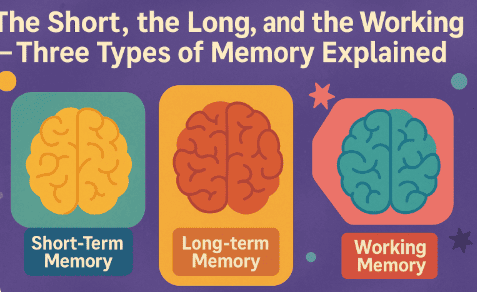
First, let’s quickly recap what we’ve covered so far in this topic:
-
Lesson 1 (Learning 101): Learning reshapes the brain through neuroplasticity. Practice strengthens neural paths, mistakes help fine-tune learning, and sleep plus a growth mindset make learning stick.
-
Lesson 2 (The Memory Factory): Memory is not a video camera but a reconstruction process. It has three stages: encoding, storage, and retrieval. The hippocampus, amygdala, cortex, and cerebellum each play unique roles.
-
Lesson 3 (The Short, the Long, and the Working): Memory is divided into short-term (sticky note), long-term (library), and working (mental workbench). They each have limits but also ways to train and improve.
Now we face an interesting twist: if memory is so important, why does the brain let us forget? 🤔 Isn’t forgetting a flaw? Surprisingly, the answer is no. Forgetting is a feature—not a bug.
Part 1: The Puzzle of Forgetting
Imagine you could remember every single detail of every day—every face in the crowd, every word you’ve ever read, every conversation you’ve overheard. It sounds powerful, right?
But in reality, it would be overwhelming. Your brain would drown in information. You wouldn’t know which facts were useful and which were just clutter.
👉 That’s why forgetting exists: it’s the brain’s cleanup system. Forgetting helps us focus on what matters and ignore what doesn’t.
Part 2: The Science of Forgetting
Forgetting happens in several ways, and scientists have discovered different “mechanisms” behind it. Let’s explore them one by one.
1. Decay – Memories Fading with Time ⏳
If you don’t use a memory, the connections between neurons grow weaker. This is like a path in the forest becoming overgrown if no one walks on it.
Example: You might remember a childhood friend’s phone number for years, but if you never use it, the memory fades.
2. Interference – Memories Colliding ⚡
Sometimes new information overwrites old memories, or old memories block new learning. This is called interference.
-
Retroactive interference: New memories erase old ones. For example, after getting a new phone number, you might forget the old one.
-
Proactive interference: Old memories block new ones. For example, if you learned Spanish first, it might interfere with learning Italian.
3. Retrieval Failure – The “Tip of the Tongue” Problem 🔑
Sometimes the memory is stored but you can’t find the right “key” to unlock it. That’s why you might say, “I know the answer! It’s on the tip of my tongue!”
The memory isn’t gone—it’s just temporarily inaccessible.
4. Motivated Forgetting – Protecting Yourself 🛡️
Sometimes the brain deliberately pushes away painful or traumatic memories to protect you. This is called repression. For example, people may not remember parts of a very scary or stressful event.
So forgetting is not always weakness. Sometimes, it’s the brain being kind.
Part 3: Forgetting as a Survival Tool 🧠
Let’s go back to our ancestors. Thousands of years ago, survival meant paying attention to important things like where food was, which animals were dangerous, and how to make tools.
Remembering every unimportant detail—like the exact number of leaves on a tree—would be useless. Forgetting allowed the brain to filter information and free up energy for survival.
Even today, forgetting helps us:
-
A student forgets useless details in order to focus on the main concept.
-
A chess player forgets old wrong moves and instead focuses on good strategies.
-
A person lets go of painful memories in order to heal.
So forgetting is not an error. It is active brain management.
Part 4: When Forgetting Goes Wrong – Memory Disorders
Sometimes forgetting becomes too strong and interferes with normal life. That’s when we see memory disorders:
-
Amnesia – Severe loss of memory, often caused by brain injury. A person may lose past memories (retrograde amnesia) or be unable to form new ones (anterograde amnesia).
-
Dementia – A gradual decline in memory and thinking, often caused by diseases like Alzheimer’s. Here, forgetting is not helpful—it destroys important connections.
-
Normal Aging – Even healthy aging involves some memory loss, but the brain still keeps important skills and knowledge.
So while forgetting is usually useful, extreme forgetting can be harmful.
Part 5: Can We Control Forgetting?
Yes, to some extent! Scientists and psychologists have studied how we can manage what we remember and what we forget.
-
Strengthen Important Memories: Through repetition, sleep, and practice, you can protect key memories from fading.
-
Let Go of Harmful Memories: Techniques like therapy and mindfulness help reduce the emotional weight of painful memories.
-
Don’t Cram: Spaced repetition works better than stuffing everything in one night, because cramming often leads to quick forgetting.
So while we can’t stop forgetting altogether (and shouldn’t!), we can guide our brain to remember the things that matter most.
Recap of Key Ideas 🌟
-
Forgetting is not a flaw—it’s a survival tool.
-
Forgetting happens in several ways: decay, interference, retrieval failure, and motivated forgetting.
-
Forgetting helps the brain filter out useless information and focus on what matters.
-
Too much forgetting, like in amnesia or dementia, can be harmful.
-
We can manage forgetting by strengthening important memories and letting go of unhelpful ones.